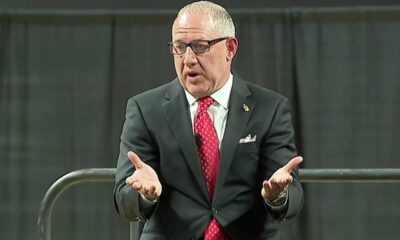News from the South - Missouri News Feed
Bill regulating video gambling faces hazy future with weeks left in Missouri’s legislative session
by Rudi Keller, Missouri Independent
March 31, 2025
A bill to authorize video gambling machines commissioned by the Missouri Lottery got off to a fast start in the Missouri House, clearing a committee just 12 days after it was introduced in late January.
The bill then stalled on the next step, and a month passed before the House Rules-Legislative Committee approved it for placement on the calendar for debate. Now, as April is about to begin and lawmakers have only seven weeks to complete their work, it is uncertain whether that debate will take place.
The bill has the backing of House Speaker Jon Patterson of Lee’s Summit, but he’s not sure the rest of the GOP caucus is ready to follow him.
“It’s a matter of, do we have a majority of the people in the chamber that feel the same way?” Patterson said Thursday at the weekly House Republican news conference. “That I don’t know.”
For more than five years there have been legislative efforts, ultimately unsuccessful, to expand legal gambling through video lottery games and sports wagering — and to shut down unregulated games offering cash prizes that can be found in bars, truck stops and convenience stores across the state.
The proliferation of what are called gray market machines is one of the best arguments for authorizing video lottery games, Patterson said.
“If people are doing it, I would rather have them regulated and taxed and to make sure that kids aren’t doing it,” he said. “So I’m in favor of the bill itself.”
The legislation sponsored by state Rep. Bill Hardwick, a Republican from Dixon, has been revised since it was introduced and another major revision is awaiting action on the House floor. To win votes, an amendment Hardwick intends to propose would cut the number of machines allowed at each location to eight and add provisions allowing local governments — cities for incorporated areas, counties for unincorporated locations — to conduct votes on whether to allow video lottery terminals.
He also removed all provisions of the bill that would have eliminated the gray market machines. Instead of phasing them out six months after video lottery is launched, retailers could keep them if they prefer rather than become lottery outlets.
They could not have both.
Last week, Hardwick had a pad of lined paper in hand, going from member to member on the floor to see if he had enough votes.
“I think that we can pass it out of the House,” Hardwick said. “I think that we should pass it out of the House.”
The best argument he has for the bill, Hardwick said, is its potential to produce revenue for state education programs. Gov. Mike Kehoe didn’t recommend a $300 million increase in the state public school formula that would fully fund the program, calling it too expensive.
According to the fiscal note, video lottery would produce $112 million in the first year and almost $350 million a year when fully operational.
There is a substantial surplus currently in the state general revenue fund, but revenues are not growing and the Republican majority wants to cut state income taxes.
“A lot of my members are thinking about the fact that the state’s going to have some tough budget times ahead, and by making a few regulatory and structural changes, we could change revenues without raising taxes on people,” Hardwick said.
For several years, the issue of gambling was a triangular debate.
Casino companies and professional sports teams eager for the revenue from sports wagering opposed the video game vendors pushing for the new form of lottery game. Both were opposed at times by lobbyists for Torch Electronics, the largest of the gray market operators and a prolific political giver.
Torch didn’t want any bill that would make the law clear on the legality of its games.
It has been active both in the legislative halls and the courtroom, where it unsuccessfully sued the Missouri State Highway Patrol to block criminal investigations of its machines.
A representative of Torch declined to comment on the revised bill.
A campaign organized by major sports teams and bankrolled by online betting platforms in November won approval of sports betting for Missouri. While that issue is off the table, casinos aren’t backing down from their opposition to video lottery games.
The number of people visiting Missouri’s 13 casinos in the final six months of 2024 was down 25% from the same period of 2019, which is about the time the unregulated machines were making their debut. The remaining casino gamblers are each losing more, on average, and net winnings for the casinos have gone up 8% in that same period.
What the figures say is that small-dollar players are choosing to play the unregulated machines, said Michael Winter of the Missouri Gaming Association.
The association considers the unregulated machines to be criminal gambling devices and the proposal for video lottery to be unconstitutional. The only place slot machines are legal, he said, is in the 13 casinos licensed by the Missouri Gaming Commission.
“I don’t think the market has stopped growing when you look at either illegals or the potential that putting in more slot machines than every location around the state could have on our properties,” Winter said. “So we think there’s still more downside and revenue we could lose if bills like this are passed.”
The bill’s controls on improper play, such as by people under 21, are too loose, Winter said.
“They don’t have set aside rooms,” he said. “They don’t have licensed personnel overseeing the machine. You’ve got a person at the counter who’s in charge of making sure that only 21-year-olds play the machines.”
The changes in Hardwick’s proposed amendment are essential to winning passage, said Andy Arnold, a lobbyist for J & J Ventures, a vendor for video lottery games.
He thinks a bipartisan majority of the House can be assembled to pass the bill, but it would be close. To get to the Senate, a bill must win 82 votes from the 163-member House.
A provision that requires the games to be in a place “distinct and divided from the primary business operation area” was important to calming fears that minors may be playing the games.
Arnold has been working to get video lottery legalized for 10 years. The arguments from the casinos are more about market share than legality, he said.
“It’s just a matter of time before people see through and see that it’s nothing more than competition,” Arnold said. “They don’t want the competition. But they’ve already got the competition from the illegal machines.”
GET THE MORNING HEADLINES.
Missouri Independent is part of States Newsroom, a nonprofit news network supported by grants and a coalition of donors as a 501c(3) public charity. Missouri Independent maintains editorial independence. Contact Editor Jason Hancock for questions: info@missouriindependent.com.
The post Bill regulating video gambling faces hazy future with weeks left in Missouri’s legislative session appeared first on missouriindependent.com
News from the South - Missouri News Feed
Preparing for hail damage as severe storms pass through St. Charles County
SUMMARY: Severe storms swept through St. Charles County, prompting concerns about hail damage. Justina Cornell reported live from Travers GMT Auto in O’Fallon, Missouri, where baseball-sized hail destroyed around 300 vehicles a year ago. This time, the dealership was spared, and the owner expressed gratitude. At around 3:15 p.m., skies quickly darkened, triggering automatic lights. Though conditions have since eased to overcast skies, areas like Possi may have suffered more severe damage. Eureka Fire officials deployed a crew, including off-duty responders, to assess the situation. Updates will be shared as information becomes available via KDKA.com and broadcast channels.

Severe storms passed through the St. Louis region on Wednesday. 5 On Your Side’s Justina Coronel has the latest from St. Charles County.
News from the South - Missouri News Feed
Trump to impose 10% base tariff on international imports, higher levies on some nations
by Ashley Murray, Missouri Independent
April 2, 2025
This story was updated at 6:55 p.m. EDT.
WASHINGTON — President Donald Trump rolled out sweeping “reciprocal” tariffs Wednesday on trading partners and allies across the globe.
Declaring that foreign trade practices have created a “national emergency,” the president unveiled a baseline 10% levy on all international imports, plus what he described as additional “kind” and “discounted” tariff rates that will increase but not match the rates other countries apply to American imports.
The levies will hit U.S. industries from agriculture to manufacturing to fashion.
The 10% universal tariffs become effective April 5, with higher levies set for April 9, according to Trump’s executive order. Trump’s remarks Wednesday about the start dates varied from the order’s language.
Trump is the first president to enact tariffs under the International Emergency Economic Powers Act — something he already did in March when slapping levies on China, Canada and Mexico over the production and smuggling of illicit fentanyl.
According to a table distributed at Trump’s speech, U.S. tariffs will reach 34% on imports from China, 46% on products from Vietnam and 20% on European Union imports, among other increases.
Canada and Mexico will not see additional tariffs on top of the already imposed 25% on goods (10% on energy and potash) not compliant with the United States-Mexico-Canada Agreement, or USMCA. All compliant goods can continue to enter the U.S. levy-free.
The new 34% duties on China are set to stack on top of older 20% tariffs, according to some media reports, though Trump did not specify in his remarks or order.
Countries that levy a 10% tax on American goods — including Brazil and the United Kingdom — will only see a 10% match.
The increased levies come as 25% tariffs on foreign cars kick in at midnight.
Business owners who purchase goods from outside the U.S. will have to pay the increased duty rates to bring the products over the border, unless Trump carves out exceptions for certain industries.
The president did not mention carve-outs in his remarks, but language in his subsequent executive order details exceptions for steel, aluminum, cars and auto parts already subject to tariffs under Section 232 of the Trade Expansion Act. Any products designated in the future under Section 232 will also be exempt from the new levies announced Wednesday.
Other goods not subject to the “reciprocal” tariffs include copper, pharmaceuticals, semiconductors, lumber, and “energy and other certain minerals that are not available in the United States,” according to the order.
Trump introduced the taxes on imports with fanfare Wednesday in the White House Rose Garden, where he said, “This is Liberation Day.”
“April 2, 2025, will forever be remembered as the day American industry was reborn,” Trump said.
“For decades, our country has been looted, pillaged, raped and plundered by nations near and far, both friend and foe alike,” Trump said.
Republican lawmakers, including House Speaker Mike Johnson of Louisiana and Georgia U.S. Rep. Marjorie Taylor Greene, attended the event alongside several of Trump’s Cabinet members and representatives from the United Auto Workers.
Not all Republicans have signaled support for tariffs. Senate Majority Leader John Thune said at an event in his home state of South Dakota in August 2024 that Trump’s trade policy is a “recipe for increased inflation.”
The White House has circulated figures claiming the U.S. will raise up to $600 billion in revenue per year as a result of the tariffs. The figure was met with skepticism by economists because the amount of imports will likely change under higher levies.
The U.S. is the largest importer of goods in the world, according to the Office of the U.S. Trade Representative. The country’s top suppliers in 2022 included China, Mexico, Canada, Japan and Germany.
Economists: Americans will pay
Since Trump began campaigning on tariffs, economists have warned that increased costs for businesses will be passed onto consumers.
Rising prices under Trump’s “reciprocal” tariff scenario are likely to cost an extra $2,400 to $3,400 per family, according to the Yale Budget Lab, with most of the financial burden falling on the lowest-income households.
An analysis from the Peterson Institute on International Economics estimated the typical American household would lose over $1,200, just from the 25% tariffs already imposed on China, Canada and Mexico.
Several small business owners told States Newsroom Tuesday they’re worried about increasing production costs and whether higher prices will chase away customer demand.
Erica York, of the center-right Tax Foundation that advocates for lower taxes, said in an interview with States Newsroom Tuesday that the levies will be “the largest peacetime tax increase we’ve seen in history.”
State officials worry over impact
Democratic state officials sounded the alarm Wednesday over losses for key industries that drive their local economies.
New Mexico State Treasurer Laura Montoya said her state’s energy and agriculture sectors would be victims in a trade war.
“New Mexico is a key player in this conversation, because the non-negotiable reality is that New Mexico is, like the United States as a whole, dependent on trade with our international partners particularly Mexico,” Montoya said on a virtual press briefing hosted by the state economic advocacy group Americans for Responsible Growth.
Montoya said oil and gas production accounts for 35% of the state’s budget and that the industry relies on machinery imported from Mexico.
Additionally, New Mexico, a largely rural state, relies heavily on agricultural trade. It processes a third of the cattle coming across the southwest border, and Montoya said farmers and ranchers will “face blows as tariffs on cattle and produce will result in slow food production.”
Washington state, a top U.S. agricultural exporter, sources 90% of its fertilizer from Canada.
Treasurer Mike Pellicciotti said the state would be “completely squeezed” by “reckless economic decisions.”
“He is crushing the free exchange of goods, and making it much more difficult and much more burdensome on working families. So of course, he needs to call it ‘Liberation Day,’ because he knows he’s doing the complete opposite, and he is trying to frame it in a way that is completely the opposite of what is being accomplished today,” Pellicciotti said.
Dems predict consumer stress
Democrats on Capitol Hill seized on Trump’s new trade policy as a way to push their message that the president is abandoning middle and working class households.
Sen. Angela Alsobrooks of Maryland said the White House is “tone-deaf” in dubbing the tariff announcement as “Liberation Day.”
Trump has said in media interviews, “‘You know, there’s going to be a little pain, some minor pain and disruption.’ But the people that I represent don’t regard increasing costs of groceries, increasing costs of owning a home, increasing costs of owning an automobile, as a minor disruption,” Alsobrooks said.
In back-to-back Democratic press conferences Wednesday, Sen. Tim Kaine of Virginia slammed Trump’s use of emergency powers in March to justify a 10% duty on Canadian energy and 25% on all other imports.
Kaine warned about the effect on his state’s sizable shipbuilding industry. Approximately 35% of steel and aluminum used to build U.S. ships and submarines comes from Canada, he said.
Senators approved, 51-48, a joint resolution Wednesday evening on a bill, sponsored by Kaine, that would undo Trump’s tariffs on Canadian imports triggered by an emergency declaration targeting illicit fentanyl coming over the northern border.
Four Republicans joined the Democrats in passing the largely symbolic legislation, which will now head to the House. The GOP senators included: Susan Collins of Maine, Mitch McConnell and Rand Paul of Kentucky, and Lisa Murkowski of Alaska.
Earlier Wednesday, Kaine pointed to a report in Canadian news outlet The Globe and Mail that found the White House grossly overstated the amount of fentanyl smuggled through the northern border.
“Canada stood with us on 9/11, Canada has stood side-by-side with U.S. troops in every war we have been in. They have fought with our troops. They’ve bled with our troops. They’ve died with our troops in every war since the war of 1812, and yet we’re going to treat them like an enemy,” Kaine said.
Kaine’s bill, co-signed by eight Democratic and independent senators, drew one Republican co-sponsor, Paul of Kentucky.
The bill gained statements of support from the U.S. Chamber of Commerce and former Vice President Mike Pence’s advocacy group Advancing American Freedom, among numerous organizations across the political spectrum.
House Minority Leader Hakeem Jeffries criticized Trump’s anticipated tariff announcement Wednesday morning at his weekly press conference.
“We were told that grocery costs were going to go down on day one of the Trump presidency. Costs aren’t going down in America. They’re going up, and the Trump tariffs are going to make things more costly,” Jeffries, of New York, said.
Last updated 7:31 p.m., Apr. 2, 2025
Missouri Independent is part of States Newsroom, a nonprofit news network supported by grants and a coalition of donors as a 501c(3) public charity. Missouri Independent maintains editorial independence. Contact Editor Jason Hancock for questions: info@missouriindependent.com.
The post Trump to impose 10% base tariff on international imports, higher levies on some nations appeared first on missouriindependent.com
News from the South - Missouri News Feed
LIVE: Trump announces sweeping ‘reciprocal’ tariffs
SUMMARY: On April 2, 2025, President Trump announced sweeping “reciprocal” tariffs intended to promote U.S. manufacturing and punish unfair trade practices. Dubbed “Liberation Day,” the tariffs target allies and adversaries alike, affecting autos, steel, aluminum, pharmaceuticals, and more. While the White House projects $600 billion in annual revenue, economists warn of rising costs, recession risks, and global trade tensions. Critics argue the tariffs are a massive, unilateral tax hike on American families. Allies like the EU and Canada are preparing retaliatory measures. The lack of clarity has fueled uncertainty among businesses and investors, despite continued White House confidence in the strategy.
The post LIVE: Trump announces sweeping 'reciprocal' tariffs appeared first on fox2now.com
-

 Mississippi Today1 day ago
Mississippi Today1 day agoPharmacy benefit manager reform likely dead
-

 News from the South - Alabama News Feed6 days ago
News from the South - Alabama News Feed6 days agoSevere storms will impact Alabama this weekend. Damaging winds, hail, and a tornado threat are al…
-

 News from the South - Alabama News Feed6 days ago
News from the South - Alabama News Feed6 days agoUniversity of Alabama student detained by ICE moved to Louisiana
-

 News from the South - Oklahoma News Feed4 days ago
News from the South - Oklahoma News Feed4 days agoTornado watch, severe thunderstorm warnings issued for Oklahoma
-

 News from the South - Kentucky News Feed7 days ago
News from the South - Kentucky News Feed7 days agoA little early morning putting at the PGA Tour Superstore
-

 News from the South - Virginia News Feed6 days ago
News from the South - Virginia News Feed6 days agoYoungkin removes Ellis, appoints Cuccinelli to UVa board | Virginia
-

 News from the South - Florida News Feed7 days ago
News from the South - Florida News Feed7 days agoPeanut farmer wants Florida water agency to swap forest land
-

 News from the South - Georgia News Feed4 days ago
News from the South - Georgia News Feed4 days agoGeorgia road project forcing homeowners out | FOX 5 News








































